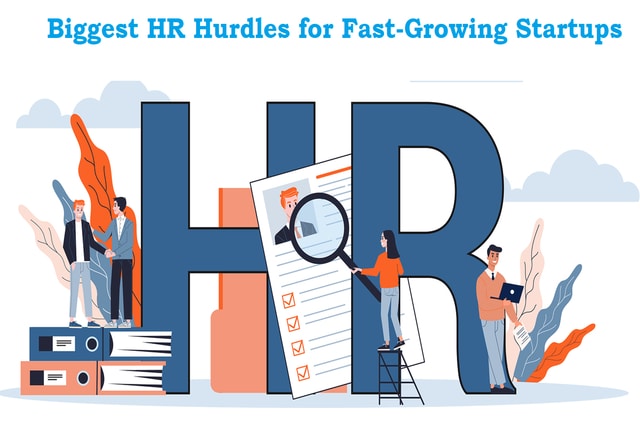What are the Biggest HR Hurdles for Fast-Growing Startups?
Startups are innovative companies that are focused on making changes in the world with their solutions. Most startups are product-oriented, and they focus solely on developing and refining their products. Though it is the core of their business, they should do it, but some other things need to be addressed too.
Hiring and maintaining an adequate workforce in the company for every possible venture is the critical role of the HR vertical. They are associated with all the activities related to employees and other kinds of workers, whether freelancers, interns, or contract-based people.

Biggest HR Hurdles for Fast-Growing Startups
Attracting talent is easier for large corporations because of the perks and salaries they can offer. But this is a significant problem among startups. In this post, we’ll look at some HR hurdles that almost all fast-growing startups and many software development companies face.
1. Hiring the Right People
There’s a general outlook towards the long working hours in startups. Due to this, many of the top brains in the industry avoid working in startups. This makes it hard for HR to find and hire the best talent. In IT companies, it is usually a difficult task to hire a dedicated developer.
Startups generally rely on referral hiring. While this is good in the early stages, it can deteriorate the quality of human resources in the company. Also, most startups don’t have a defined culture, work timings, and benefits bouquets that attract top workers.
Moreover, startups are usually smaller companies that are yet to make a name in the industry. So they have a hard time attracting job seekers to their company. They don’t have an established brand image as large corporations. Moreover, they lack the deep pockets of larger businesses, so it is harder for them to go over the budget and find suitable candidates to fill the place.
2. Creating a Learning Culture
Employees working in fast-growing startups are always occupied with work, and this leaves them with no time to focus on learning. HR verticals have a hard time creating a learning culture in such scenarios because they cannot sacrifice the companies’ growth for individual growth also.
To create a good learning culture, the HR department needs to have a free hand in organizing training and developmental activities for the company’s employees. Moreover, it needs to be proactive in such events; only then a proper learning culture can be set up.
Skilled employees are an excellent resource for any company, and to take things further, learning should be rewarded. In startups, leaders should allow employees to take some time off and focus on developing their skills. Such steps can ignite the fuel in others too.
Moreover, to create a learning culture, the company needs to take some advanced steps and spend large sums on training, workshops, and other learning materials for employees. As fast-growing startups are short in cash, they cannot do this, and ultimately it becomes a big hurdle for the HR department to develop a learning culture in the company.
3. Diversity Management
Diversity is an essential concept for any startup that wants to be a global leader. Diversity emerges from cultural differences, people coming from different backgrounds, locations, age groups, gender, and more. HR departments at startups are very scarce of resources, and due to this, they cannot do much in making every employee feel included in the company.
They need to embrace changes as they grow and enhance diversity management.
As fast-growing startups lack offices in different geographies and their reach is also less, they tend to fail at diversity management. Any company progresses well only when it has people coming from diverse backgrounds and cultures. This allows space for brainstorming from different perspectives, and new ideas can be brought forth.
Startups usually attract local smarts, and thus they lack diversity among the team. Moreover, the HR department cannot go forth the geographical boundaries and hire new talent if the company is not famous in those areas.
4. Not Creating Solid Policies
Startups are known for their open-minded work culture and less strict policies. Many people are attracted to this and end up doing wrong things. The HR departments of fast-growing startups have faced lots of problems in creating policies. Founders are focused on developing the business, and they tend not to care about making solid principles for the company’s functioning.
Policies can help protect businesses and the company. Moreover, they can act as a guideline for everything the employees and company can do. Running a startup with solid policies is like driving a vehicle without brakes. You’ll end up in bad scenarios.
When policies are overlooked, chances of security incidents or even theft and other mishaps increase. Moreover, there’s a lack of rules and guidelines in the company, which can create more significant problems. Startups solely focus on their service and growing fast. Due to this, they leave out on establishing company principles. A company that is built on solid principles and policies will always succeed no matter what happens.
5. Retaining Employees
Fast-growing startups have some of the best minds in their teams, but they tend to resign after working under pressure constantly for some years. HR departments at startups struggle to retain employees, and this is a big hurdle for every company.
Most early-stage startups operate under tight budgets, and they work hard to make ends meet. So it is hard for such companies to provide hikes and even retain employees by increasing their salaries substantially. While on the other hand, more prominent companies can easily spend a few more dollars and retain their high-performing employees. HR departments at startups try out everything in their hands, but large corporations constantly beat them down, and that’s a hurdle for every small company.
If the startup cannot retain employees, it will soon have to deal with low-performing and B-level talent from the industry. Working with such employees will be challenging, and the company will run into losses.
6. Administrative Burden
Fast-growing startups leave a lot of underlying work for other departments. The company is constantly shifting and growing, due to which there will be a change in a lot of aspects like documentation, sales, record keeping, accounting, and more.
Moreover, the startup will also hire a lot of new people when it is growing, and the administrative burden of the HR department increases because of this. When the load increases, HR functions disrupt, and administration in the company deteriorates. This is a significant hurdle for any startup that has accelerated growth.
While the company grows at a rocketed speed, its HR department also needs to develop and adopt newer mechanisms. What worked for the company when it was often people won’t work when the company grows to a hundred or three hundred people in a short time. The HR department should be given software to ease down the administrative burden; otherwise, there can be a lot of delays and mishaps.
7. Less Focus From Management
The HR department is something that startup founders ignore. They are so invested in building their core services and products that they are not interested in any other things. Many people consider HR an unnecessary expense and tend to avoid it. Due to this, even if the company has HR, the management does not focus more on it.
Moreover, fast-growing startups require the full attention of management in making crucial decisions. Hence the HR aspect is often overlooked and left to sustain on its own by the administration. Due to this, HR has to take care of most things independently. If the HR department is less experienced in handling such responsibilities, then the problems will increase significantly, and hurdles will keep on stopping the company’s growth.
8. Building Company Culture
Startups don’t have a predefined culture. Everyone is so busy growing the business that there’s nothing like company culture. Moreover, due to this lack of time, building company culture becomes really hard for every HR department.
Startup founders believe that the company will gradually define its culture on its own or adopt another company’s culture. But that’s not a good way to run a company. Doing this can have a negative impact on the company’s reputation. Hence building company culture is essential.
The lack of knowledge regarding culture cultivation in founders creates new hurdles for the HR department.
You need more than a good idea to run a startup successfully. Many startup companies understand this very late in their journey, and they’ve lost much more by then. Companies need to focus on solving HR issues, as it’s the employees who make up the company at the end of the day. If HR hurdles are not solved, progress can be hindered, and there are chances that the company will start losing out on better business opportunities and growth.
Having a good company culture, where every employee is included in everything, and there’s no discrimination is really crucial. Happy employees tend to work better and stick with the company through thick and thin. All these things can be achieved once HR hurdles are solved. While these might look easy, they are certainly not, but with the right HR teams, you can achieve it all.




